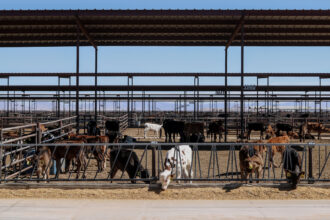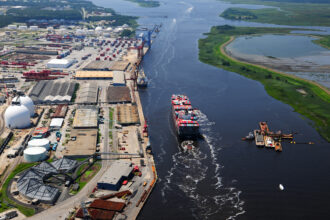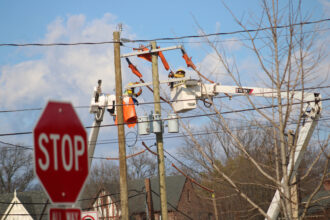Green groups sued the U.S. government on Wednesday to stop the clearing of grasslands and other work on a pipeline to bring Canadian oil sands crude to Texas, opposed by environmentalists for the petroleum’s high greenhouse gas emissions.
The Center for Biological Diversity, the Western Nebraska Resources Council and Friends of the Earth sued the U.S. State Department and U.S. Fish and Wildlife Service to stop work they called “illegal construction” on the 1,700 mile pipeline.
Backers of the $7 billion TransCanada Keystone XL pipeline say it will provide jobs and reduce U.S. dependence on oil from countries that are unfriendly to Washington.
Environmentalists oppose the line, however, because crude produced from oil sands releases large volumes of gases blamed for warming the planet and because it would cross the Ogallala Aquifer, a massive source of water in the heartland of the country. There have been several small leaks on an existing Keystone pipeline in recent months and environmentalists say a larger leak could damage the aquifer.
The suit, the first of many legal and regulatory hurdles the pipeline could face, was filed in the U.S. District Court in Nebraska. The complaint can be seen here: link.reuters.com/gad34s.
TransCanada wants to build the pipeline to take 500,000 barrels per day of crude from Canada’s vast oil sands near the forests of the western province of Alberta to refineries in Texas. The line could also drain U.S.-produced oil from new oil fields that has caused a glut in the Cushing, Oklahoma crude hub.
“It’s outrageous that TransCanada is already clearing the way for the Keystone XL pipeline before the public has had a chance to have its say and, indeed, before federal agencies have even said it can be built,” said Noah Greenwald, endangered species program director at the Center for Biological Diversity.
The groups say the State Department and the Fish and Wildlife Service have quietly allowed TransCanada to do the work, including mowing a corridor of native prairie grasslands in Nebraska’s ecologically sensitive sandhills region and moving an endangered species called the burying beetle from the path of the pipeline.
The State Department is expected to decide later this year whether the pipeline can go forward. It has already released impact assessments that say the line would not wreck the environment.
Opponents of the line say more suits will likely be filed in federal court over endangered species, wetlands and other issues once the State Department approves a presidential permit of the line, which is required because the project crosses the U.S.-Canadian border.
The U.S. Fish and Wildlife Service referred requests for comment on the suit to the State Department, which did not immediately reply.
About This Story
Perhaps you noticed: This story, like all the news we publish, is free to read. That’s because Inside Climate News is a 501c3 nonprofit organization. We do not charge a subscription fee, lock our news behind a paywall, or clutter our website with ads. We make our news on climate and the environment freely available to you and anyone who wants it.
That’s not all. We also share our news for free with scores of other media organizations around the country. Many of them can’t afford to do environmental journalism of their own. We’ve built bureaus from coast to coast to report local stories, collaborate with local newsrooms and co-publish articles so that this vital work is shared as widely as possible.
Two of us launched ICN in 2007. Six years later we earned a Pulitzer Prize for National Reporting, and now we run the oldest and largest dedicated climate newsroom in the nation. We tell the story in all its complexity. We hold polluters accountable. We expose environmental injustice. We debunk misinformation. We scrutinize solutions and inspire action.
Donations from readers like you fund every aspect of what we do. If you don’t already, will you support our ongoing work, our reporting on the biggest crisis facing our planet, and help us reach even more readers in more places?
Please take a moment to make a tax-deductible donation. Every one of them makes a difference.
Thank you,











